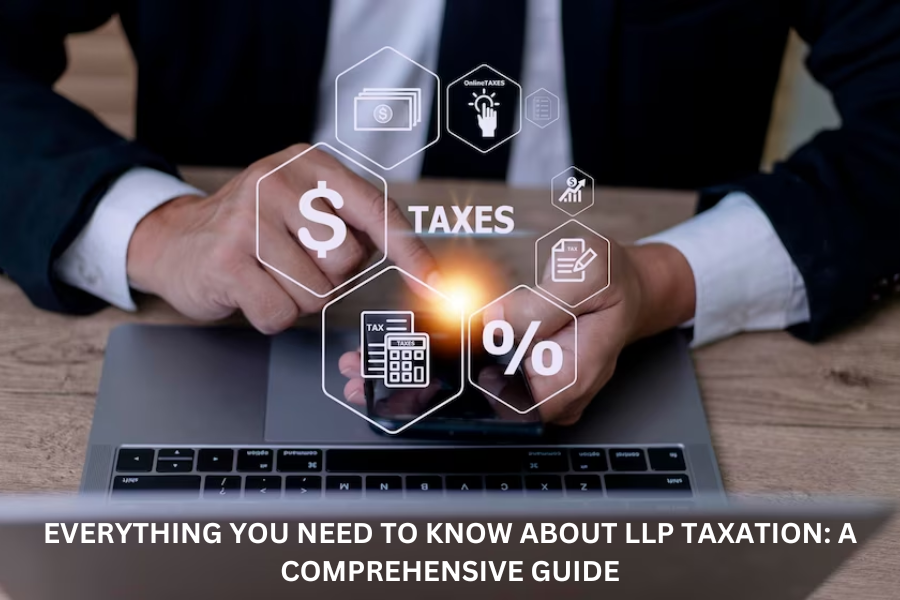Introduction
Limited Liability Partnerships (LLPs) are a popular choice for entrepreneurs due to their flexibility as well as liability protection features. Understanding the taxation aspects of LLPs is crucial for efficient financial management. In this comprehensive guide, we will explore every aspect of LLP taxation, from the compliances after you Register a LLP to also advanced tax strategies, providing you with a thorough understanding of how LLP taxation works in different scenarios.
What is an LLP?
A Limited Liability Partnership (LLP) is a unique form of legal entity that blends the features of a partnership as well as a corporation. In an LLP, partners have limited liability, meaning in case of business debts their personal assets are protected. LLPs offer the flexibility of a partnership while providing the protection of a corporation.
Taxation Structure of LLPs
1. Taxation as a Separate Legal Entity
Firstly, LLPs are taxed as separate legal entities, similar to companies. They have to pay taxes on their profits at the applicable corporate tax rate. LLPs file their taxes using Form ITR-5.
2. Income Tax on Partners
Additionally, the partners of an LLP are taxed individually for the profits they receive from the LLP. This taxation occurs under the head ‘Profits as well as Gains of Business or Profession’ in their personal income tax returns.
LLP Taxation: Key Concepts
1. Taxation Rates
LLPs are taxed at the corporate tax rate, hence t is essential to stay updated with the prevailing tax rates as per the Finance Act of the respective financial year. Currently all LLPs are taxes at a flat-rate of 30%.
2. Tax Deductions
LLPs can claim various deductions such as business expenses, depreciation, and also employee benefits. Understanding the eligible deductions is vital to optimize tax liability.
3. Goods and Services Tax (GST)
If the LLP’s turnover exceeds the GST threshold limit, then they must register for GST. Compliance with GST regulations is crucial to avoid penalties.
4. Taxation of Capital Gains on LLP Assets
When an LLP sells a capital asset, such as property or investments, any capital gains arising from the sale are taxable. The LLP must calculate the capital gains based on the sale price and also deduct the indexed cost of acquisition. Hence, understanding the exemptions and indexation benefits under the Income Tax Act is crucial for optimizing capital gains tax on LLP assets.
5. Tax Deduction at Source (TDS) Compliance
LLPs have to comply with Tax Deduction at Source (TDS) regulations when making payments such as salaries, professional fees, or interest exceeding specified thresholds. Ensuring timely deduction, deposit, and filing of TDS returns are essential to avoid penalties and legal consequences. LLPs must also issue TDS certificates to the deductees, specifying the details of the deducted tax.
Taxation for LLP Partners
1. Taxation of Profits
Firstly, profits earned by the LLP are divided among the partners based on the partnership agreement. Each partner is individually taxed based on their profit share.
2. Capital Gain Taxation
If a partner transfers their share in the LLP, then any capital gains arising from the transfer are subject to capital gains tax.
3. Taxation of Salaries and Bonuses
Moreover, the salaries and bonuses paid to partners are considered business expenses for the LLP and are taxable in the hands of the partners.
Compliance and Filings
1. Annual Filings
LLPs have to firstly file their annual returns with the Ministry of Corporate Affairs (MCA). Timely filing is essential to avoid penalties.
2. Tax Audit
Aldo, LLPs meeting certain criteria have to undergo a tax audit as per the Income Tax Act. A tax audit ensures compliance with tax laws and regulations.
Advanced LLP Taxation Strategies
1. Profit Allocation
Partners can strategically allocate profits to minimize tax liability. Understanding the nuances of profit allocation is essential for tax optimization.
2. Cross-Border Taxation
For LLPs engaged in international transactions, understanding cross-border taxation, including Transfer Pricing regulations, is vital to avoid legal issues as well as double taxation.
Conclusion
Mastering LLP taxation is essential for both LLPs as well as their partners. It ensures compliance with the law while optimizing tax liability. Consulting with tax experts and also staying updated with the latest tax regulations is the key to efficient LLP taxation. By understanding the intricacies of LLP taxation, businesses and partners can focus on growth and innovation, knowing that their financial structure is robust and legally sound.










